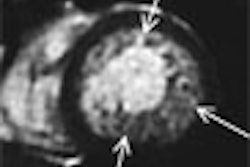Dear AuntMinnie Member,
Breast MRI is refining its ability to detect and characterize breast lesions, and is changing patient management in some cases. A pair of studies we're highlighting this week in our MRI Digital Community demonstrates breast MRI's growing role.
In the first article, staff writer Shalmali Pal describes a recent study in which U.S. researchers assessed the performance of breast MRI in characterizing ductal carcinoma in situ (DCIS) prior to surgery. The hope is that more accurate characterization can help breast surgeons remove more DCIS tissue, which in turn should reduce recurrence rates.
The group found that MRI performed well in assessing DCIS features such as size and percentage of breast tissue involved with DCIS. But the modality did have some shortcomings, which you can read about by clicking here.
In another article, we present a case study in which a breast MRI computer-aided detection (CAD) program was used to help stage a woman who had infiltrating ductal carcinoma. The study demonstrates how breast MRI's unique contrast-enhanced kinetic properties can help guide treatment of cancerous lesions. Read all about it by clicking here.
Apart from breast MRI, we're also featuring a wealth of other studies on MRI's diagnostic power. U.S. researchers used functional MRI to examine the impact of cocaine abuse on the neuronal functioning of the brain -- get that story by clicking here. And another U.S. group used MRI to find a link between celiac disease, a gastrointestinal disorder, and the onset of cognitive impairment. Learn more by clicking here.
Get these stories and more news in the world of MRI by visiting our MRI Digital Community, at mri.auntminnie.com.



















